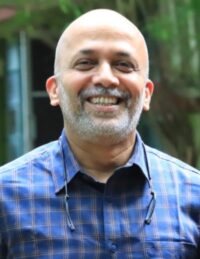
Dr. U. Indulal underwent a unique 7½-year gurukula education programme offered by Coimbatore Ayurveda College, run by The Arya Vaidya Pharmacy (Coimbatore) Limited, a pioneer Ayurveda institution in India, and graduated in the year 1993. He then worked for The Arya Vaidya Pharmacy (AVP) and was involved in its clinical, academic, research and manufacturing activities for 25 years. After leaving AVP in 2018, he has been active as Chief Editor of Abhinava Dhanvantari, a journal of Ayurveda published by PNNM Ayurveda College, Shoranur, Kerala, as Executive Director – Operations, Akami Ayurveda Hospital & Research Center, Kerala, and as Dean, Academics of Swiss Med School, Geneva, Switzerland.
Abstract of the lectures:
Ayurveda and Sanskrit: How a language sustains and enables a living medical tradition
Sabda pramaana or verbal testimony carries the traditional Indian medical knowledge of Ayurveda. A Sanskrit medical text is to be correctly understood by the vaidya, who uses it as a tool to analyse the observations made during the encounter with a patient and to make an accurate clinical decision. Only one factor outweighs textual knowledge and that is the vaidya’s experience, which is nothing but an outcome of the repeated process of knowing and applying what the texts speak. The clarity, scope, and efficacy of Ayurveda tenets happen through a thorough search and re-search in the minds of the vaidya, which is stored with this pramaana. The validity of a medical explanation or a clinical intervention lies in its affiliation with a textual reference. Thus, each content in an Ayurveda text is revered as a mantra – a responsible way to treat a pearl of received wisdom that has a perceivable positive outcome – and reciting it daily is a ritual. Despite the changes in curriculum and pedagogy, such a practice continues among young and old scholars, who value its purpose. In olden-day Kerala, the first fifteen chapters of Ashtangahridaya, an Ayurveda text that presents the medical knowledge as a poem, were taught to young non-medical students to serve two purposes – help to them learn Sanskrit and use the knowledge gained to lead a healthy way of life. Such is the reach and use of these Sanskrit medical texts.
In these two lectures, we will see an introduction to Ayurveda medical texts in Sanskrit, their structure, the method of study conducive to such a science, how Sanskrit and our understanding of the texts enable an effective application, and what we miss in the process of translation.
Readings
1. Importance of Sanskrit language in learning Ayurveda – Lekshmi VR et al.